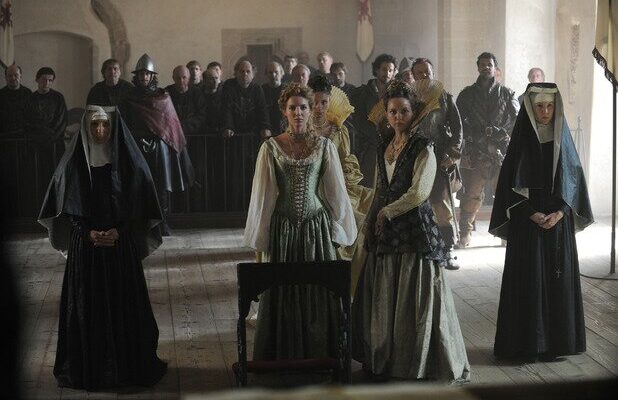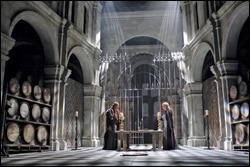Photo Credit: DigitalSpy.com
Warning: Spoiler Alert
This most recent episode starts out the way each and every one of them should. Busy streets creating a chaotic battle ground for sword fighting. A man dismounts his horse and begins to unload his haul when a group of men try to separate his goods from him. Aramis and Athos spring into action. While that is going on, the King’s procession makes its way through and a young girl jumps onto the royal carriage and immediately falls off.
Side Note. This may sound exceedingly American of me, but the French language is a thorn in my side. I appreciate BBC’s attempt at authenticity. But can’t I get one guy named Fred Smith or a woman named Mary Franklin. I spend a decent amount of time Googling or skimming through IMDb just to make sure I’ve got names spelled correctly. Rant over, moving on.
As it turns out in 17th century France, educating women is a touchy subject. The girl the was flung from the carriage merely wanted to address the Queen about the education of women. While the Queen and the Cardinal debate exactly where the jurisdiction lies or whether its even worth contemplating at all, an attractive and fiery woman enters the room. I can only assume based on her tone and wit that she is the ‘rebellious woman’ responsible for the episode’s title. She said her piece and leaves.
King Louis: Did she just refuse my company?
Queen Anne: I believe she did, sire.
King Louis: Is that allowed?
Cardinal: Apparently Contessa de Larroque believes herself above the normal laws and conventions of society.
The Cardinal meets with Milady de Winter to exact some leverage on Larroque. Something he can use against her as he finds the prospect of educating women a bothersome problem that must be dealt with swiftly. The conversation is not met with an empathetic tone as Milady is a woman and takes some offense to the idea.
At Larroque’s house/place for learning we see Milady reading a book as the Musketeers enter uninvited. Athos asserts himself and his approach is not received well from Larroque. What follows is an interesting exchange between Athos, Larroque and eventually Aramis. It is flirty to be polite. Which is what makes it curious. Athos stands firm while Larroque advances. Asks questions of a personal nature. And all the while, Athos’ former wife looks on unnoticed.
The Cardinal meets with the man who was the subject of the robbery in the cold open. He is a priest that has a history with the Cardinal. Their meeting revolves around the idea that the Pope (Spain’s little monkey) has a problem with France’s treaty with Sweden. Apparently Sweden is running a muck with Protestants and the Pope doesn’t approve.
Back at Larroque’s place, she caves and agrees to accompany Athos while they check every room in the house for Fleur Baudin. Fleur has been missing since the incident involving Therese (the girl who jumped on the royal carriage). The flirtatious tone of the conversation between Athos and Larroque continue throughout the house. By the end of the search, more wit is exchanged and then saliva is exchanged. I may be falling for Ms. Larroque, so the shipper in me really wants Athos to follow through.
Luca, the priest visiting the Cardinal, comes with an agenda. However, the agenda is not exactly devious. They do the dance. Luca asserts that the Cardinals job aiding the King is compromising his job as Cardinal. The Cardinal retorts with decisions made for France need not be questioned by the religious element. Luca presents a gift and then a bombshell. The bombshell being that the Cardinal is the frontrunner to take over as Pope after the Pope passes. Which will be sooner than expected.
We rejoin Ms. Larroque in her home, but this time she is joined by Milady de Winter. (DANGER Will Robinson!). Milady is tending to Larroque’s hair and inquires about the ‘kiss’. They share some girl talk then Milady inquires about Fleur. “Just between us, is Fleur here?” Larroque stares blankly but does not deny it.
Athos returns to Larroque. She continues her flirty ways in his presence. Athos puts a halt on the proceedings as he needs Larroque (or wants her) to identify the body of the dead girl. This immediately puts a halt on all the charm. Larroque is visibly shaken which is a departure from her general demeanor. Not to fear, once out of the smell range of the dead bodies, the flirting continued. They shared a short conversation about the curse of marriage. And just as Larroque was transitioning from the marriage issue to the prospect of sex, a man gets thrown out of a door literally.
The man doing the throwing is Aramis. He looks toward Athos and nonchalantly says, “Trouble.” The man being thrown is one of the Cardinal’s men.
Clearly on orders to flesh out this ‘heretic’ of a woman who dares to defy God’s rules about not educating women. A lot to digest there. Then inside, the Cardinal’s men are detaining women and destroying property. Athos and Aramis continue fighting off guards and their swords with the lethality of textbooks. Eventually, a couple guards emerge with a few young girls in tow. Larroque implores Athos, but his hands are tied. Perhaps if she had not lied about Fleur being there, this would have gone differently.
This is without question the best ‘King Louis’ episode to date. He is normally a whiny, spoiled, and entitled bore. But he has been fun tonight.
We find the Cardinal, Luca, the King and Queen discussing the matter of Ms. Larroque. The Cardinal starts in on the suffering the girls must have experienced. Then Luca charges in with typical Catholic overstepping consistent with the opinions of the day. Insinuating the presence of witchcraft. The King laughs it off.
King Louis: Contessa de Larroque? A witch? How marvelous. Can she fly on a broomstick? Make love potions?
Luca: Your majesty is joking but Satan is real. And his female familiars are everywhere amongst us. Evil must be extinguished no matter where it is detected. Rome, will be following these events with great interest.
(Luca looks to the Cardinal)
King Louis: What a wonderfully unpleasant little man.
Queen Anne: Witchcraft, what nonsense.
A couple of things with this. Did Luca just compare women who wish to educate themselves without the dependency of a man to the mindless human lackeys that work for vampires? One is real and one is not. Women = Evil has always been a concept that I have trouble with. Kings kill women for not producing male heirs (despite such fault falling to the man anyway). Women shouldn’t read, own land or vote, because they are somehow inferior. Yet woman, not men have the power to make people and men do not. Interesting that this idea of women are evil ever made it past the laugh test.
I would imagine over time, we at NJATVS will really push for a certain characters to receive credit for their performances. For example James Spader as Reddington is magnificent (The Academy of Television Arts and Sciences should be ashamed of themselves). You can look forward to our steadfast coverage of the Blacklist in a matter of weeks. Joe MacMillan (Halt and Catch Fire), Ichabod Crane (of Fox’s Sleepy Hollow), Castiel (Supernatural), just to name a few off the top of my head. I’d like to add Aramis of The Musketeers.
Athos, D’Artagnan, and even Porthos are what they are. There is some interpretation to the roles. However, Santiago Cabrera has added depth and texture to a character that has been as many times over as arguably any other character in annuls of television and film. Cabrera’s interpretation of the character Aramis, in my opinions catapults his version of Aramis into that rare group of truly exquisite characters in modern television.
The Musketeers arrive at the destination of Larroque’s ‘trial’. I’m telling you this feels like Salem North Carolina took a vacation to France. Athos is being Athos and standing on his moral high horse because Larroque deceived him. Aramis steps in and in a very Aramis sort of way, flips the perspective.
Aramis: You’re being hard on her. She was protecting the girl, not deceiving you.
He then has some words with Ms. Larroque. Words that in the right order and inflection would make most women weak in the knees.
Back at Constance’s boarding house where Fleur has been returned, D’Artagnan observes from a safe distance. There is crying and talk of accepting your fate in life. Fleur rejects the idea just in time to see the man of the house (Constance’s husband) return. Who is a p.o.s. of a man. He grabs Fleur and attempts to back hand her. D’Artagnan interjects, “that won’t be necessary”. He pulls harder dragging the girl towards the door. D’Artagnan interjects again. This time almost invading the man’s personal space with his finger extended towards the man’s face.
“If you hurt her, I’ll know.”
In the Cardinals office, Robert Baudin (Constance’s husband) asks the Cardinal for leniency when dealing with Fleur. The Cardinal only asks that she tell the truth at the trial. God will be watching.
This trial is a mockery. A figurative witch hunt. The Cardinal obviously takes the testimony of Fleur and attempts to twist it around to seem somehow dirty or wrong. The we introduce Milady de Winter as a witness. Madame de la Chappell is the name she’s going with today. This ought to be rich. And as she begins to lie straight through her teeth, Athos recognizes her voice. Right about the time she says she awoke with her clothes removed, Athos snaps.
After the short intermission presented by Athos, the trial continues. Well, at least the manipulation of what the trial continues. As the Cardinal delivers the verdict that Larroque is a witch that consorts with the devil and is condemned to die, the Queen enters. The Queen relays that unless the Contessa confesses her crimes absent of torture than she is to be spared.
Larroque says a few things including but not limited to “I have never consorted with the devil until now, and I’m looking at him (the Cardinal)”. Then the Cardinal attempts to claim that those words spoken are just as good as a confession. But he is unable to do so. He begins to gag repeatedly. They attempt to administer what I have to believe is a very medieval poison remedy, which the Cardinal fights against while the King resorts to his typical whiny self.
As we return, the Queen approaches Aramis. A subject in and of itself a sensitive subject for the Musketeers. Aramis has a thing for the Queen and at times the feeling seems mutual. Its best not to leave these two alone for too long. She noticed Aramis’ necklace on Larroque and infers that they are lovers. Aramis dispels this notice quite politely and quickly.
Inside the empty courtroom, Aramis and Porthos address Athos about the woman witness and his outburst. Before they can get an answer, the obnoxious Luca enters. The answer to who poisoned the Cardinal flew right off his tongue, “It was the witch”.
Milady, upon the Cardinal’s request, visits Larroque with the intention of forcing a confession. Instead of using force she leans towards manipulation. She claims that if the Contess does not confess, her pupils will die in her place. Which naturally she cannot allow. So she confesses to a crime that doesn’t even exist much less one she committed.
The Musketeers venture back to the would-be coroner to retrieve Luca’s bag that was stolen by one of the deceased. They inquired as to how the thief died. He was drinking and laughing then out of the blue he began convulsing. Just as the Cardinal had done previously. Well, maybe King Louis will actually get to put someone to death he genuinely doesn’t like.
The Musketeers, uncovering Luca’s plot, race back to the Abbey in order to stop whatever is in motion. Problem is they are unaware of the confession. Before they can get to Luca, Luca gets to the Cardinal. He attempts to stab the Cardinal in his bed. The Cardinal somehow musters enough strength to resist Luca. The Cardinal, while holding Luca’s arm with one hand, goes to stab Luca with a hidden small fork of some sort. After the Cardinal stabs him with the fork, Luca grabs it with his other hand just in time for Athos to shoot Luca and thus thwarting any further damage.
With that particular scenario neutralized, there is still the matter of Larroque set to burn alive (literally as they speak). In this moment of clarity and mortality, the Cardinal has a rare episode devoid of motive. As we watch the fire grow and I think to myself, “pretty people shouldn’t be burned to death”, the Musketeers leap into action. Screaming the sentence is commuted by order of the Cardinal. While tearing away the bundles of branches to get to Larroque. She says, “I am not to die today”. “Not today” replies Porthos.
The Cardinal is not completely flying straight. He still has a navy to build and no resources in which to do it. So his plan involved seizing all of Larroque’s land and assets and to exile her to a monastery where she will live out her days quietly. The Cardinal’s moment of clarity it seems served as nothing more than the fire to fuel his thirst for power.
Cardinal: Today, I find my vision clearer than ever. Nothing. No person. No nation. No God will stand in my way.
In a very Cardinal manner, he takes the religious relic that was a gift from Luca (also poisoned by Luca as a delivery device) and poured Luca’s ashes over it ordering a man to deliver it to Rome with his compliments.
In the woods on their way to deliver Larroque to her new residence, Athos and Larroque have a moment. He almost divulges his familiarity with the lying witness. She in turn warns him that Milady has the protection of the Cardinal and that Athos should tread lightly. She then proclaims that Athos could be the kind of man she could love.
“Too bad we’re not the marrying kind”-Athos
Fleur returns to the house where Constance and D’Artagnan sit. Fleur is ecstatic that a woman convinced her father to not sell her into marriage. Fleur believes that woman in question is Larroque, which Constance is happy to let her believe. When she leaves the room, D’Artagnan asserts that it was Constance who convinced the father. Then there is a development I did not see coming this soon.
D’Artagnan: You are the finest woman I have ever met. I don’t believe there is a more generous soul in all of France.
Constance: (putting her hand to his mouth) Stop that. You’re embarrassing me.
D’Artagnan: If I wanted to embarrass you, I should list all the reasons I love you.
(He looks off into the middle distance trying very hard to not make I contact. Constance looking intently into his eyes)
D’Artagnan: Of course when I say that, I mean admire, respect.
Constance: Say it again.
D’Artagnan: I admire and respect you.
Constance: Not that part you idiot.
D’Artagnan: …I love you.
(And then you can imagine what follows. These shows may have a rating system, but we try to keep our recaps and articles family friendly.)







